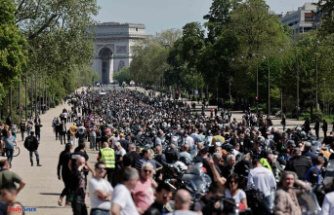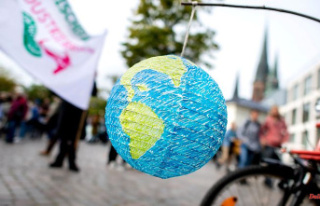Cold, sickness and death lurk at the front in Donbass. The morale of Ukrainian fighters is high. But the winter is getting more and more difficult for them: "The soldiers' boots are always wet, they only sleep very sporadically."
Winter has not yet begun, but the wet and cold are already affecting the Ukrainian soldiers in Donbass in eastern Ukraine. "We literally live in a swamp," says a 30-year-old man who calls himself Kit during the war. "When I went to the hospital yesterday, I looked like a big pile of mud." More and more soldiers are getting sick, many suffering from the so-called trench foot, a feared infection of the feet.
"The soldiers' boots are always wet, they only sleep very sporadically," says a 24-year-old, nicknamed Taller, who is fighting with a special unit in Donbass. If feet are stuck in damp shoes for too long and are stressed at the same time, they become inflamed. Left untreated, the trench foot from which soldiers suffered en masse in World War I can even be fatal. "The infantry is at the heart of any army, and they suffer a lot," says Taller.
Since the withdrawal of the Russian military from the southern Ukrainian city of Kherson earlier this month, the Donbass in the east of the country has been the main theater of fighting. The adverse weather conditions did not prevent the Russian troops from attacking. "The Russians are like zombies. You shoot at them, and more and more come," says Kit.
In order to prepare the Ukrainian soldiers for the winter, volunteers have set up large camps with donated relief supplies near the front. "Warm clothes are very much in demand, as are long underwear, flu medicine, medicinal tea and pain-relieving ointments," says Slava Kovalenko, who works at one of these depots in the city of Sloviansk. "Everyone who comes here asks about it." Week after week, he distributes thousands of pounds of clothing, medicine, candles and canned goods, says Kowalenko.
The front can be seen on the outskirts of Bakhmut: rows of Ukrainian artillery pieces and tanks line the brown landscape. The noise of battle is deafening. A soldier watches the action from a hilltop, smoking. "We are preparing for a counter-offensive," says the man with the combat name Rambo. "We have reinforced our troops in this area," says another soldier, nicknamed IT Guy. "Our morale is very high," he insists.
Amid mounting casualties in the fighting, the Kremlin has redoubled its attacks on Ukraine's infrastructure, destroying power plants with drones and cruise missiles. The power goes out more and more frequently. The hospitals near the frontline rely on generators to feed soldiers and civilians.
"The way they fight and attack the civilian infrastructure can only infuriate," says Oleksiy Yakovlenko from the hospital administration in Kramatorsk. Still, giving up is out of the question for him. "If they expect us to get on our knees and crawl to them - that's not going to happen."
In the blocks of flats in Lyman, 40 kilometers away, there has been no electricity or gas since the spring. The city is in ruins. The few remaining residents are too poor or too old to leave. They are dependent on the support of aid organizations, only those who have wood can heat them. "I don't know how we will survive the winter," says 62-year-old Tatyana Kutepova. "Maybe we'll freeze to death, and then they'll take us to our graveyard."












